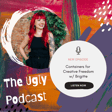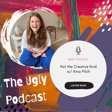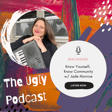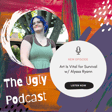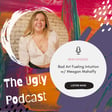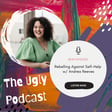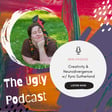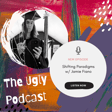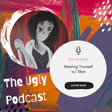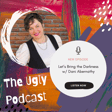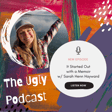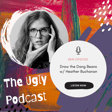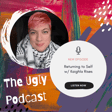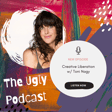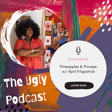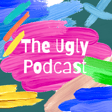Introduction to the Ugly Podcast
00:00:03
Speaker
Welcome to the Ugly Podcast. I'm your host, Lauren Alexander, she, they, and this is the place where creatives are encouraged to make messy, ugly art and let go of perfectionism.
Podcast Evolution
00:00:14
Speaker
I started this podcast with my creative partner, Emerson, and we've since grown into our businesses. And this podcast is now evolving into a space where I interview other creatives to discuss our creative processes and how we navigate the mental mind field of creativity. This podcast serves as a reminder that you and your art get to be whatever the hell you want to be, ugly and all.
Special Guest: Kim Worker
00:00:41
Speaker
Hello everybody and welcome back to the Ugly podcast.
00:00:45
Speaker
This is just a really exciting, exciting episode today. I am joined by somebody who had a parallel experience to my ugly art journey and we're going to just get all into it. So my guest is a publisher, editor, author, and maker, co-founder and publisher of Canadian Small Press 910 Publications. She spends her days creating books and an online magazine. By night, she's a weaver, crocheter, and knitter who spends at least a few minutes every day making something.
00:01:14
Speaker
Through her project Mighty Ugly, she encourages adults to make something ugly on purpose as a creativity exercise. She lives in Vancouver, Canada with her husband and son Anna Mutt, who's named after a tree. Welcome. Would you please introduce yourself with your name and pronouns, please?
Kim's Creative Journey
00:01:31
Speaker
Hi, everyone. I am Kim Worker. She, her. Yay!
00:01:36
Speaker
So good. Okay, I do have to ask, what is your dog's name? Ah, I was wondering. Our dog's name is Cedar. Cedar. Oh, that's such a cute name. Yeah. I heard him like outside my office during because of his name. Oh, so cute.
00:01:54
Speaker
I'm really excited to chat with you. So I went to the Women in Publishing Summit this year in March and somebody, I was talking about the Ugly podcast and my vision for everybody to just make more art and just make it ugly and not worry so much about the outcome. And they're like, oh, you should read Mighty Ugly. And so I bought it immediately. That's how you found out about the book. That's amazing. Yeah. That makes me so happy.
00:02:22
Speaker
I wish I should have looked back to see who it was that recommended it to me. But shoot, I didn't. But yeah, yeah, just recommended it at a writing summit. And so yeah, I bought it immediately. And as I was reading it, I actually have this bookmarked because I was like, Kim is me. Kim is writing my book. Kim already wrote my book back in 2014. Like what is happening? Is it okay if I read this to you? Yeah. Okay.
00:02:48
Speaker
For most of my life, I insisted I was not creative. I didn't enjoy art, class, and school. I did not make stuff. I felt like I was an odd person. I did not fit in. I was awed by creative people, though. Silent and intimidated, I liked being around them, but I felt unworthy of their full attention because I knew I had nothing to give them back. That's exactly how I felt all growing up. Did not think I was creative, didn't think I fit in, but I was just so in awe of creative people. Yeah.
00:03:18
Speaker
Oh, yeah. What a sad thing to bring us together. Hearing you read that back to me, I was like, I was sad about that for so long.
00:03:31
Speaker
But what actually ultimately brought us together was how we've surpassed that. So tell me a little bit about how you started coming into the ugly art space and how that kind of started occurring to you. Yeah, for sure.
Kim's Crafting Industry Experience
00:03:45
Speaker
And interrupt me because it's a long story that I'm going to try to keep brief.
00:03:51
Speaker
Like, it's kind of perfect that you started with that, because that is 100% how I felt. And in the mid 2000s, at like, even as I felt that way, I started working in the craft industry. And I and I kind of fell into it, it happened kind of by accident, because I had been knitting for about a year, it was so trendy back then to learn how to knit and I was living in a new place. It was not long, it was about
00:04:18
Speaker
A year after we moved to Vancouver that a new friend invited me to take a knitting class with her and I learned how to knit. And then a year later, I was like, well, it's time to learn how to crochet and this was also a time when right blogs were becoming super mainstream and I had
00:04:33
Speaker
taught myself HTML in the late 90s, and I was really interested in the internet as a community building tool and what was going on. And there was so much happening with knitting that when I took up crochet, I went looking for the same kinds of things. Online magazines, blogging communities, this whole kind of stuff, and there was almost nothing there.
00:04:56
Speaker
And so I got angry about this. Like the more I thought about it, I was like, what's the big difference between these two crafts? And so it, it wasn't like creativity that brought me into the crafts world. It was like injustice and anger and inequality between these two crafts. And I was like, well,
00:05:13
Speaker
I may not know much about this new craft to me, but I sure know how to make a website about it since there are no websites. That's what I'm going to do. And like, that's what I did. I got super mad and I, and I wrote like a manifesto about crochet and how it deserves its day in the sun too.
00:05:31
Speaker
and invited people to share crochet with me. I was like, I don't have any crochet to share, but I can be a conduit for yours. And that was the beginning. That's how I ended up working in craft. I built a website. It was around the time there was like a crochet forum that was just starting up around the same time. And so that crochet community was starting to form online.
00:05:53
Speaker
And I catapulted myself into the industry because we were the first sort of online magazine in crochet, certainly not the first online magazine. I didn't invent anything there, but, um, I was in the right place at the right time. And I had these other skills that it took me years to really become comfortable identifying.
Overcoming Creative Insecurities
00:06:13
Speaker
Um, I could make a website that was like human readable in a pleasant way. And I could.
00:06:21
Speaker
Right. And I could edit and I could organize other people to create something. And so that's what I did. And I, and I suddenly then was working in the crafts industry. I was working in the yarn industry. I ended up writing books about crochet. I ended up being hired to be the editor of a very prominent crochet magazine. And all of this time.
00:06:44
Speaker
I actually enjoyed knitting a little bit more because I wasn't working in it all the time, but I didn't feel creative. It was that like, oh, oh, oh, I work with craft designers, but I'm not one. And the truth of the matter is like spoiler alert, I'm not, I hate designing craft. I don't like making patterns. I don't enjoy any of those things. But at the time I saw that is I am not creative. I just work with creative people. Right.
00:07:13
Speaker
In working with creative people, I also was in a position, I started teaching crochet. Um, and I found that I was different in how I didn't like doing things in that people would tell me that they couldn't and they would frequently tell me that they were scared. And those were the words they used. They talked to me about their experience of craft in the language of fear.
00:07:42
Speaker
I'm afraid if I do it, I'll do it wrong. I'm concerned that I'm, I'm all left thumbs and I'll never be able to do something dexterous with my hands, not to, not to be negative about left-handers. Um, right? Like, and so, so I, but that's not what I felt. Like I felt very much imposter syndrome before I knew what those words were. I thought that people were going to find out I was a fraud.
00:08:09
Speaker
in terms of my own craftability. But I never felt afraid of it. And the more I spent with people in the context of learning and trying new things and being out of their comfort zone, the more I realized that
00:08:25
Speaker
They really did feel profound like physical discomfort with this idea And so that stuck with me free for years of working in crafts and eventually I burnt out I had said everything I ever was gonna say about crochet. I sold my business I walked away from this dream job that I had and I kind of tooled around for a while and then one day I just well, I had a whole experience that I write about in the book, which was I
00:08:53
Speaker
my own ugly making experience. And it was then that I discovered a pattern in how I work, which is that when I experienced something profound like that, like I did that day about crochet, I want to share it with the world and bring everybody into it. It's not just mine alone. And that is where the Mighty Ugly Project came
Birth of the Mighty Ugly Project
00:09:12
Speaker
from. It was like, oh, I made something ugly. It was magnificent. I felt so liberated.
00:09:17
Speaker
It was so exciting and therefore every single human on the planet needs to make ugly things on purpose. And especially the folks that I had encountered year after year after year, who said they were afraid to. So that's kind of where that came from. I skipped over the whole anecdote about that ugly making experience. I don't know if you want me to go there or not, but that's kind of how things went.
00:09:40
Speaker
amazing we can get into that uh in the in a moment but yeah i i just the the way our experiences are mirrored um because yeah i i got into i mean and so
00:09:54
Speaker
to tell you a bit about my background. Like I was in like corporate America. I hated it. And I just, you know, the pandemic did the whole thing where it made me reanalyze my life. Right. So I started taking an editing course and then I got my certificate in editing, started my editing business, started working
Lauren's Creative Shift
00:10:12
Speaker
with writers. And I was just like, yes, I'm working with writers. I'm working with creative people. I'm helping facilitate their visions and it's great.
00:10:20
Speaker
And, but then at the same time, you know, when you have a business yourself, you have to do the thing and be creative and market yourself. And I, I had what your, the people you worked with experience, which was that very real deep fear where my body would react. And it was like, Nope, you can't press post on that blog post. Someone's going, you're going to die. A bear is going to come out of nowhere and mall you and just that whole body experience. And so, yeah, when I had my ugly art experience and I was like,
00:10:49
Speaker
Oh, I can make it bad. And it doesn't matter. It just opened up the world for me. And yes, same thing. I'm just like, everybody's got to do this. Everybody's creative. If I'm creative, you're creative. We're all creative. Yes. And honestly, this is what I love about NaNoWriMo in writing. Yes. Can I swear? I don't have to swear. Can I swear? It's about the shitty first draft, right?
00:11:16
Speaker
Nobody's first draft is great. And I love NaNoWriMo because it gives you, right? This is National Novel Writing Month, which happens in November. And the idea is to write a 50,000 word manuscript in 30 days. There's no way to do that well. So you just, it's about quantity over quality, which is not the way most of us think about writing, but
00:11:36
Speaker
so much of writing well is in revising. It's about just sitting down and filling the page and then you go back and you can fix it all, right? We as editors know this, but it's really hard to do unless you do something outlandish like say, yeah, I'm going to write a 50,000 word novel in 30
Critique of the Education System
00:11:55
Speaker
which I've never completed, but I love doing it. Anyway, it's about the shitty first draft. Yes, it is. And I think that's like, that's one of the ways I feel like the American school system really fails us is because we only we turn in just like
00:12:11
Speaker
Basically, we turn in first drafts, essentially. How often? I mean, unless you're in an intensive English course where you're actually doing multiple drafts, you're really just doing one draft of something and turning it in, and you get a grade on that, and then that settles it. That's it. It's final. That's how you did. Instead of looking at it as like, no, do it more often, and you will get better. We don't look at that growth mindset that way. I had this English teacher in grade seven who was amazing. And only last year.
00:12:40
Speaker
like in thinking about this recognized that I became a writer in his class because I did that, right? We had to write like a paper about a book that we had read. And he was a super intense guy. We were reading things that were not usual grade seven things. Like looking back, I was like, what? Not everybody had their grade seven teacher read Beowulf to them out loud. Like, okay. It was so super weird class.
00:13:03
Speaker
But he, I will never forget sitting. I remember where I was sitting in his class when he put my paper down and he put his three fingers down on the paper just quietly until I looked up at him. Such a teacher move. Yeah. Right. And he said, do it again. And it was like,
00:13:22
Speaker
this magnificent like I remember the waves of emotions I first felt crushing shame because I had done it poorly and he was not pleased but then I was like but he told me to do it again like I have another chance and he had marked it up it was full of writing he asked questions he made suggestions and he and I did and I took that shame and I was like well
00:13:46
Speaker
He's giving me this opportunity to let go of that shame. I have this other chance and I actually hunted him down. Not hunted as the wrong word, but I found him last year. I wrote him a letter. We ended up having a talk on the phone. It was this beautiful moment, but it was just that one thing he did. It took like 15 seconds of his life and it changed mine forever. Wow.
00:14:09
Speaker
Anyway. I love that. It was awesome. That's so good. I try to be that as an editor, right? Yeah. People give me their things that are so close to them and so personal. And it's my job to help them make it better while also making them believe they can, right? Yes, exactly. Yeah.
Kim's First Ugly Art Experience
00:14:31
Speaker
Oh, it's so good. I see. I just feel like you're a kindred soul. 100%, but I have to go like, what? Oh, this is so good. Um, okay, so yeah, let's talk about that first, that first time we can kind of share our first ugly, ugly experience stories together. So tell me what yours was like.
00:14:54
Speaker
So I'm going to set the stage. My son hates when I do this. He's like, you're getting all dramatic. So this was all of the kind of history of my career happened when I was in my mid 20s. And around the time that like my whole cohort of friends was turning 30, my one super artsy creative friend decided he was going to throw himself like a crafty birthday party. And I didn't know what this meant, but I was like,
00:15:18
Speaker
I think this might be up my alley? Like what does he have in mind? And he had this tiny little apartment and he put up, you know, like twinkle lights and turned all the lights off and he had some sewing machines out and he had like glue guns and all of this kind of stuff and like snacks and drinks. And it was like, come and be crafty and make stuff in my apartment with like super lab music and snacks and drinks.
00:15:39
Speaker
That's so delightful. I want to do that. It was like, I would like to do this now, right? And so I went to this party and then like, that was the imposter syndrome. I was like, Oh, my friends who for like years now know that I have this bizarro job where I work on the internet and I have worked for this publisher in the US that they don't know anything about because they're not crafty and like,
00:16:05
Speaker
I know that like whatever I did during my day and for my career was like the super weird thing that nobody really understood, but it was crafty and now they're going to find out I'm not crafty. I'm not creative. I'm not artistic. I don't have this great talent and skill.
00:16:23
Speaker
And so I sat like really sad face like sat on a couch with my like little like solo cup of punch while everybody was having fun and laughing and I just like sat there and I felt like I was in middle school at a dance like standing in the corner being a weirdo and
00:16:40
Speaker
not feeling comfortable being a weirdo like now this is what I love about middle age like what's wrong with you that you think I'm a weirdo right like but right this was not the way and so there was this giant bag of fabric scraps sitting next to me on the floor and I was kind of idly like
00:16:58
Speaker
like just sifting through it with my fingers and eventually I came across this fabric and it was it was ugly but it was also textured so in a tactile way it was really nice to kind of play with and and eventually I was like you know I was going through this phase where in crochet I was making a lot of dolls and I was thinking very sculpturally
00:17:17
Speaker
And I just had this thought that like, well, I liked this fabric. I kept coming back to it because it's so hideous. What if I made something ugly with it where I tried intentionally for the thing I made to be ugly? And since I was working so much in dolls at that point, and there was also like a big bag of polyfill, you know, by the sewing machines and everything, I was like, well, what if I make an ugly doll out of this fabric? That feels like it would be within the scope of my ability.
00:17:47
Speaker
And so I like, you know, poked my friend in the shoulder and she reminded me how to thread a sewing machine because it had been a long time. And I cut two symmetrical-ish pieces of this fabric and I sewed them together like a doll. I kept an opening open to shove the polyfill in. And then I didn't quite remember how to make an invisible seam. So screw it. I made a very visible seam. And then I found the ugliest buttons I could and I hot glued them. And this is a part, I don't know if you've seen her, but I have heard like so.
00:18:20
Speaker
incredible yeah so i'm 47 years old almost and this is shoshana who i made almost 17 years ago uh and when i was finished with her so this fabric is like kind of a white woven fabric with the orange and green fuzzies i always forget what the name of this fabric is but it's like upholstery fabric uh so it's orange and green and the the buttons i found that i hot glued onto her face are these like
00:18:48
Speaker
clear glass buttons about an inch or more in diameter with big red centers in them so she looks like she's possessed and then because I could and I needed to feel better and Shoshana feels that she's beautiful I crocheted her a brown curlicue scarf.
00:19:05
Speaker
She has no arms. She has only legs. She has this frankenstein like sewed up and all along the side as well. Like it's just messy stitches. But I mean structurally sound like she's old like
00:19:21
Speaker
Yeah. She stood the test of time. I lost myself in making this. As I was sewing, as I was stuffing, as I found myself going like, well, what would make her uglier? What could I do to make her uglier? As her personality was coming into my imagination, as I was doing this, it's like the whole
00:19:43
Speaker
background of the party disappeared. And it was just me with a little lamp sewing and making this ugly thing. I don't remember talking to anyone after my friend helped me thread the machine. I don't remember if I ate cake. I don't remember how I filled my cup up again. But I remember finishing and feeling so satisfied and standing up like I stood up in my chair, moved back and everybody looked at me. I was like,
00:20:09
Speaker
Look what I made! And people's faces were like, uh, are we supposed to feel happy for you? And I was like, I made her ugly on purpose! And people were still like, I don't understand why you would do that. Yay! Right? And it was this whole weird thing. And the feeling though, like that was it. I felt so happy. And so I kept that with me. That was back in,
00:20:40
Speaker
I don't know, 2006 or so. And it wasn't until 2010 that I started the Mighty Ugly Project. So that sat with me for a while until finally I was like, wait a minute, everybody needs to do, and then I invited friends
Mighty Ugly Workshops
00:20:57
Speaker
over. I didn't tell them why. I got to experience the gamut of their reactions to this, which ranged from this is the greatest it's so liberating to like visibly blanching and putting their head between their knees because they felt lightheaded.
00:21:10
Speaker
it was this whole kind of thing and then I started doing it in workshops and I started traveling with it to events and eventually I wrote a book about it and it was this whole kind of thing but like that was the moment where everything started to make sense to me in the world and I frankly started to feel more comfortable
00:21:29
Speaker
admitting and accepting that I'm a creative person and everybody's creativity comes out in a different way. And I love to be creative in ways that are absurd and inconsequential, right? I would be a miserable person if I tried to be a working artist. This is not something that I would like to do. However,
00:21:50
Speaker
I would love to sit in a room full of people and talk about the things that make us creative and that keep us from being creative. And this is what I would. And then I would love to dump a whole bunch of trash on the table and be like, let's make stuff from it. So it was very, very liberating for me. And now I'm very excited to hear about yours.
00:22:09
Speaker
Oh, that's so good. That's such a great story. And I love that you still have her there with you. That's, I'm gonna have to get a picture from you so I can post that on social media along with all the announcements for this because you all need to see her. She's glorious. I'll send it to you. Oh, so good. Okay, yeah, so mine, and I actually haven't
00:22:34
Speaker
Talked about this on the podcast. My parents are listening. I'm really sorry. Because my very first ugly art experience happened on psychedelics. And I honestly think I needed that because of how blocked I was. Like I said, I would have those very intense, perfectionistic, anxiety, panic attacks. I would feel it all in my body whenever I felt like being creative.
00:23:01
Speaker
I had these watercolors in my watercolor paints in my closet and they were dried out to hell they'd been in there for 10 years and I tried psychedelics for the first time and I was like I know this is supposed to like make you feel creative so I'm just gonna like have these out and here and I can play with them if I want.
00:23:21
Speaker
And I did. I started painting. And everything that came out on the page, I was like, this is the most amazing thing I've ever seen in my life. The colors are incredible. I can just go. And every brush stroke, I was like, this is amazing. Everything's amazing. I'm amazing. I'm so creative. I can do anything. And I'm looking at this picture, and I'm like, this is the most incredible thing I've ever seen in my life.
00:23:46
Speaker
obviously later the psychedelics wore off. And I look at this painting and I actually lost it. I have no idea where it went and I'm very sad about it, but it is the most hideous thing you've ever seen in your life. It is just, I mean, splashes of color, like they make their, it's just a brown splotch in places. It's all melded together. It is
00:24:07
Speaker
an absolute nightmare. And I just clicked. I was like, oh, it's not the end product that matters. It's how I felt in the moment. And then ever since then, I've just been recreating that feeling.
Lauren's Ugly Art Revelations
00:24:21
Speaker
And it was so liberating, especially that feeling of after knowing that, oh, I don't actually need psychedelics to do this. That was just a part of it that helped me get past.
00:24:33
Speaker
the fear that I had built up. But ever since then, it's just like, I just, I love it. My, my favorite writing piece that I ever did after it. So I, I decided to do a little ugly writing exercise where, and this was like shortly after this discovery, where I would start with, who was it? What was their name? I forget.
00:24:59
Speaker
My character woke up on Monday morning and then every five minutes I would pause and I would insert something crazy into the story and then I'd have to like resume writing and as I'm writing the first five minutes goes off and I'm like and Catman Statham walks through the door and it's this it's Jason Statham but with a cat head and he walks into the door and that's like how the story starts and it's just
00:25:22
Speaker
I don't know, it made me so euphoric in this just wild way of like, what can my brain come up with? Like, what else is in here that makes no sense, but is so hilarious to me? Maybe not to other people, but to me, it's hilarious. And yeah, it's just ever since then. I just love it. It's great. Yeah. It's like we forget at some point that we can have fun.
00:25:48
Speaker
Yeah. And I mean, not even just about making stuff, like we can have fun periods. Like adulthood is so serious. But like, the greatest thing I did in middle age was go back to roller skating. It's the greatest, right? And the roller skating community is like mighty ugly, but sport. It's super body positive. It's you cheer when people fall down because it's learning. It is so accepting and welcoming. And you're doing something new as an older person, right?
00:26:17
Speaker
All of it was like, oh, I get the same kind of euphoric feeling from that, which ties into like these things I've learned about myself, like it's absurd and inconsequential and therefore,
00:26:31
Speaker
I can roll with it and it's super over all with it. But it's yeah, it's super fun.
Childlike Creativity and Original Wounds
00:26:39
Speaker
And that feeling is it's almost like we we believe at some point that we we shouldn't feel that feeling because that's childlike and we're serious adults and it's just doing such a disservice to ourselves. Yeah, exactly. I I love how ugly art just like reconnects us to that childhood self. That's
00:27:01
Speaker
It's so important, and especially because one of the things you mentioned in your book, and I've talked to Kami Osman about this. I don't know if you're familiar with Kami Osman, but she's awesome. She's a writing coach down in Bellingham. And she talks about the original creative wound that almost everybody has at some point where somewhere along in your childhood, somebody told you what you're doing is bad and you're not creative and you should just stop.
00:27:29
Speaker
And we all have that at some point, or like we saw somebody do something better than us and they got praised and we didn't get praised. And we're like, okay, well, I guess I should just stop. You know, like, yeah. Yeah. 100%. So what's really interesting to me, thinking back even to that grade seven experience is that like.
00:27:51
Speaker
I'm a writer by trade in many ways, and I never felt that about writing. I always felt super confident about writing, and maybe it's because nobody told me that I shouldn't. And I was praised, and I was encouraged, and all of that kind of stuff. But in the visual arts, so there was this time in grade two, and I think I wrote about this in the book, where it was my first experience, nobody told me anything. But this was where I became my own barrier, was when I tried to make
00:28:19
Speaker
We were making things out of cardboard. And for whatever reason, I don't remember what the assignment was. I was seven years old or eight years old. I don't remember what it was. But I was creating a cardboard robot. And in my mind, it was going to be me sized. So like, whatever, three and a half feet tall, right? And out of shoe boxes and whatever. And I couldn't.
00:28:44
Speaker
do it by myself. I didn't have the intuition, and I certainly didn't have the experience, to sort out how to make it structurally sound, to make it stand up, to make it have legs that held it, to, you know, lying down on a table. Yeah, maybe, but in my mind, it was a freestanding and I was frustrated. And I can't remember how it ended, but I internalized from that experience that I wasn't good at it.
00:29:07
Speaker
And then fast forward to like another city and a lot of years and I was I think in middle school art class and that was when the teacher who all of the artsy kids loved told me that I should probably go into the sciences.
00:29:25
Speaker
And I was old enough to know exactly what she meant and old enough to go to high school and take every elective to satisfy my art requirements that were not art class. I took shop and I took computer-aided design. I learned how to plot things on big plotters when I was in high school because it was no use to me to take an art class.
00:29:54
Speaker
And like, every day I kind of wake up and I'm like, screw you, look at what I'm doing in my life. But it was those that parent experiences, I think it was like a confirmation of what I had started to learn when I was seven. And, you know, looking back, it's like,
00:30:11
Speaker
And we talk about that euphoria that we stop feeling as adults, but I feel like it's so within reach to us because if we think about any child in our life, anybody under the age of like six, even five, like whether it's our own children or a niece or nephew or a friend's kids or something like that, when they make art, they think it's a masterpiece every time.
00:30:34
Speaker
They love it, and they will show it to you, and then you're in a position to be like, oh, I better know what it is that scribble is, or I'm going to offend them. But then we tell them it's a masterpiece. We tell them it's wonderful. We ask them how they felt when they made it. We tell them the well. We notice how long they spent on it. And boy, is it important to them that they did that. And we say all of those things to them.
00:30:59
Speaker
And it never occurs to us to say it to ourselves or to each other. And so it's within reach. I think we can imagine it. It doesn't have to be this grand fought for epiphany because we naturally do it to the children in our lives. Unless, you know, we're those people who dash children's dreams. And I'm just going to believe that everybody listening to this or the people who want to lift children up.
00:31:22
Speaker
But so just as we have experienced the power that an offhand comment from an adult can have on us, it would be silly of us to discount that we have the equal and opposite power to be positive. And we can do that for ourselves. Like when we take classes as an adult to learn new things, there's this often this, we pretend like nobody can see.
00:31:47
Speaker
and it's uncouth and it's like it's inappropriate to comment on other people's things, but why can't we say, oh, I see how hard you're trying there, just like we do with kids. And, you know, like we could and why, you know, we could do the same to ourselves. And so I think it's just that little bit of a tweak and then a whole universe opens up. Yeah. It's just that little bit of permission that you give yourself to ask, like, what could I do? Oh my God. Have you seen in Kanto?
00:32:17
Speaker
No, I haven't. Oh my, you need to watch in Kanto. There is this one song in particular where, so this, the, one of the sisters is like the flowery sister and she just makes all the most beautiful things and she's always making the beautiful things and that's what's expected of her. And then one day she's like, her sister, the main character like gets her all fired up and she gets angry and she creates a, ooh, stuttered there. She creates a cactus.
00:32:45
Speaker
And then all of a sudden, it's like, I just made something unexpected. And she sings this whole song about like, what else can I do? What else do I have the ability to make? And I cry every time I watch that movie and hear that song because it is exactly along these lines of ugly art and the ways that we hold ourselves back from
00:33:03
Speaker
what we could actually do with the world, what we could give to ourselves just for fun, just to make ourselves feel good and uplifted and excited, not because we need to sell things or prove to other people that we're worth it, but just because we deserve to create.
Empowerment Through Creative Risks
00:33:19
Speaker
Yes. And, and it's more than that too, because it's, it's like, and I talk about, I'm almost flippant about like this inconsequential thing with me and creativity, but there are tremendous consequences. It might not be the thing that I make, but when we allow ourselves to enjoy taking creative risks,
00:33:39
Speaker
It's a skill we have to practice, right? It's not like after I made this one ugly doll, I wasn't like transformed into somebody who's creative all the time, but I did shift my perspective whenever I had the opportunity.
00:33:52
Speaker
well, to do anything, to try new things, to decide that what I was going to do or try or make or say or be in the world could be of consequence. And that is of tremendous consequence, right? That's like when we...
00:34:11
Speaker
stop believing that we can't when what we're really feeling is stuck or uncomfortable, when we start to prove to ourselves that we can.
00:34:23
Speaker
and that the experience itself is worthwhile, then suddenly it can become, well, what else have I been holding myself back from? What else might I feel uncomfortable about? Where if I just moved through that discomfort instead of staying behind it, I might feel better about all kinds of things. I became a more active activist when I became more comfortable exploring things I was uncomfortable with. So there's all of these kinds of things where
00:34:53
Speaker
You know, creativity, when we talk about it in the context of making things, doesn't just stay in that little box. It becomes a part of us, just as it was a part of us that we felt uncreative and weird and odd and held back and comfortable only hiding in the corner, sitting on a couch while everybody else has fun around us, right? Like when we come out of that kind of mentality,
00:35:17
Speaker
then there's all kinds of things we can apply that comfort to. Because we're going to know in the end that trying and failing doesn't conjure this bear coming out of the woods and mauling us to death. Exactly. It just means you didn't quite get done what you set out to do. So maybe that's over and done with, or maybe it's an opportunity to try something differently next time. But it's like, you know, there's so many things of consequence that can come from
00:35:43
Speaker
having a little bit of fun and letting ourselves off the hook and starting to believe that it's worthwhile to make things just for the sake of making them. Yeah. Not to get all heavy. No, but that's exactly right. And when you live your life that way and you're willing to show up that way and show other people, look what I made. Look at this thing that I tried. Isn't it terrible?
00:36:08
Speaker
then also it gives people a little bit more safety of like, oh, I can show this vulnerability to this person at least. I can maybe take the first step in exploring that creativity or exploring something that I'm scared of too, because this person's doing it and they're making me feel safe to do it too. And it's a ripple effect to the people in your life. 100%. There is power in showing your vulnerability to others.
00:36:36
Speaker
And yes, a hundred percent. I mean, like the thing that I always struggled with was marketing a project that was about making ugly things.
Challenges of Marketing Ugly Art
00:36:44
Speaker
Nobody wants to get in on that. Right. Like so the best time for me was always like at events where I could like be bubbly and shiny. Like, no, you come, come do my workshop. Like it's going to be great. And then, you know, people come in and they're like, what even is this?
00:37:01
Speaker
But like, you know, I almost hugged my editor through the telephone when he told me they wanted to name my book, Make It Mighty Ugly, because my agent was like, you can't put that in the title when you pitch this book.
00:37:15
Speaker
And I was like, okay. And the book didn't sell great anyway, but I'm still really glad that I wrote it. Yeah. Yes. And that's how I feel about this podcast too. Every once in a while, I'm like, maybe I should change the name. And I'm like, no, it's the ugly podcast. That's what it is. That's what I love about it. That's the whole point. And I love it. That's awesome. Yeah. That's super cool. I've never talked to somebody else who also had that challenge. Yes. Yeah. We do.
00:37:41
Speaker
We do. We do because it's great. 100%. We have this idea that everything we do has to be good or have value. This belief leads us to burn out. It can hold us back from creating altogether. But in my Ugly Art 101 course, I break down these restrictive beliefs and lead you through exercises that intentionally subvert perfectionism and bring playfulness back into your creative process.
00:38:06
Speaker
You can get the first day absolutely free by going to my website, scribe and sunshine dot com and signing up on the homepage. Join me in my weird, ugly art revolution. Back to the show. OK, gosh, I don't even need to look at my questions that I sent you. I've just been chatting. I will ask, what is what does the word ugly mean to you now? Hmm.
00:38:34
Speaker
Oh, now. Oh, that's a good one. What does it mean to be now? Honestly, that's, I didn't think of it in that context. And what is immediately coming to mind, and maybe this is BS, but I don't think it is, is that ugly to me now means an opportunity.
00:38:55
Speaker
It's an opportunity to find the value in something that would otherwise be very, very easy to dismiss. And again, I think that gets heavy really quick when it comes to encountering, right? Like what is ugly in a societal context, right? Often something that's different from what we are, something that's unfamiliar. And like, you know, when we practice looking at
00:39:24
Speaker
objects that we find displeasing, and we allow ourselves to see what the value or purpose or consequence is of them, then we can bring that with us into the world as well. And it makes us a whole lot more willing and able and graceful in navigating real life situations that are different from what we're comfortable with and familiar with. And that makes us
00:39:53
Speaker
way more tolerant and open-minded as individuals. But when I see something ugly, I see an opportunity not to dismiss it and to say, let me stop, take a step back, look at it from these different perspectives. What might the maker have been thinking or feeling? Why do I think it's ugly? Where might other people perceive the beauty? Does it have to be beautiful to be
00:40:22
Speaker
of value, you know, like all of those kinds of things. And I don't know if before, to contrast it against now, I ever really thought about ugly in that way. I think part of why I couldn't understand the fear that my students were talking to me about was that I felt comfortable screwing things up when I was learning.
Personal Growth and Embracing Change
00:40:44
Speaker
It never made me stop to get something wrong when I was learning something. And
00:40:54
Speaker
like my own growth of kind of like, don't be a jerk, right? Just because I was a jerk, because I was like, what's wrong with you? Like, give it a try. What are you gonna you know, especially because I worked in yarn where you don't even ruin anything, you just pull the yarn out, you use the exact same yarn to make your next thing, right? So, so that kind of
00:41:14
Speaker
patience and understanding that I developed because I forced myself, I wouldn't let it go. I wasn't comfortable just being that jerk who is dismissive of other people's real emotions, right? And so I think that's what I feel now when I see ugly. And I see this as a parent all the time with my kid who would be very quick to dismiss things because of the way they look, which usually like every time I get a haircut, he legit looks at me and says, it's ugly.
00:41:43
Speaker
which is, I know, it's hilarious. I'm like, good for you for not using euphemisms. Like you're saying what you mean, but also you're being insensitive, but also let's recognize that every single haircut in the world is not ugly. It might be that you need a minute to adjust to something changing, right?
00:42:09
Speaker
Let's just breathe through this. Maybe he's going to grow into an adult who dismisses things based on their surface, you know, appearance and not from my lack of trying, right? But there are those conversations that we have now where I'm not offended by him saying it because honestly, I think ugly is great, right? Like, okay.
00:42:34
Speaker
You know, sometimes maybe I'm a little too adventurous with how I cut my hair, but it's going to grow back. And it's not about what other people think of it. It's, you know, what do I think of it? I hate my haircut right now. It'll grow.
00:42:49
Speaker
Thankfully I don't spend all day staring at myself. I've been slowly growing my hair out and I started making posts on Instagram about kind of comparing it to how like when you're writing a book, it doesn't look good as it's growing. It doesn't look how you want it to look, but you need to not cut it. You got to keep letting it grow. So I thought that was a fun metaphor. Yes.
00:43:17
Speaker
Yes, I love that. I love the it's an opportunity to look deeper into into something into its origins into where it's come from into where it's going. Yeah, that's really beautiful. It makes me think of another line in your book that I also bookmarked.
00:43:38
Speaker
He said, the more that I thought about ugliness, the more excited I became about beauty. The more I accepted my failures and failings, the more confident I felt about trying new things. It's exactly right. It's exactly what we're talking about. Yeah, it is. It's weird to have me quoted to me.
00:43:57
Speaker
I'm like, I didn't mean to make you feel weird. No, no, no. That's fine. That's great. I mean, it's a good kind of weird. That's awesome. But I think it's true. And it's like, I'll try anything now. And the thing that I've taken, like after I wrote the book, I started thinking a lot about perfection.
Critique of Perfection Ideals
00:44:15
Speaker
Pinterest was really coming into its own around that time. And I got a hated Pinterest. And then also Instagram, because it was like everybody's perfectly curated life, right? Yes.
00:44:26
Speaker
This is fiction. This is fiction. This is a lie that people are telling us. And it's great. And it's beautiful to look at. And that's great. But the inclination that so many of us have to look at other people's fictionalized surroundings and decide that theirs are bad.
00:44:46
Speaker
is really high. And so I started thinking a lot about perfection and what perfection is. And I hate it because I also think it's boring, right? Like it's great. You know, if I walk into like a new friend's home and it's this beautiful magazine worthy layout, there's a part of me that's like, but what is their personality?
00:45:08
Speaker
Yeah, where's you in this? Yeah, who are they? Can I accidentally spill something? Like, where do you live? Where is your unfolded laundry? Because I don't believe you don't have it, right? And so that aspect of perfection, I find it, it's dull. It's boring. I don't want to live an actual life.
00:45:36
Speaker
that is as sanitized and perfectly curated as a photograph that took hours to create. I like the mess. This is important. And when it comes to making things, so much of our discomfort is in trying things that we don't feel confident doing yet. And because we're not comfortable trying something and doing something,
00:46:00
Speaker
that doesn't come easily to us we tend to give up before we can put in the time to get good at it and so the thing that I took to doing a ton of work on after Bitey Ugly came out is about what is perfect at different stages of learning to do something.
00:46:18
Speaker
When you first crochet a scarf, your first crocheted scarf is going to have very messy edges because new crocheters, like 99.9% of them, have a really hard time identifying the very technical thing, the stitches at the edges of their work.
00:46:37
Speaker
And that means that sometimes they add too many and sometimes they don't make enough and it makes the edges go like this. And I know this as a fact and I'm perfectly comfortable saying that of the thousands and thousands of people that I taught how to crochet, this is the beginner issue. And it's perfect for your first scarf.
00:46:55
Speaker
That is what your first scarf is going to look like. Good for you. You have done it. This is your first scarf. Do you have to wear it with pride? No. But don't look at it and say you're not good at this. Because what you have done here is perfect for what it is.
00:47:14
Speaker
And now next time around, now you've done it, and we're going to look. And I'm going to zoom in, or I'm going to pull out a magnifying glass, and we're going to look at those stitches. And you're going to be ready to level up. You're going to be ready to say, oh, now I can see these hard to see things. And your next scarf is going to be straighter by miles. And it's still not going to be perfect, right? But that's perfect for what it is. And we hold ourselves to impossible standards when we
00:47:43
Speaker
don't give ourselves the grace of celebrating what we make when we're learning. The pottery that's lopsided, the cakes that fall in. All of those kinds of things are perfect for what they are. And I wish that we would remember that more and then get excited about how it'll be the next time. Yeah.
00:48:10
Speaker
I love that perfection at different stages of the learning process. Yes, I love it. We can't compare ourselves to people who really know what they're doing when we're beginners. That's unfair. The expert doesn't want us to do that. Nobody expects that of us but ourselves, so we can just let that go right now, throw it away.
00:48:32
Speaker
Yep. Yeah. That's why I love seeing people's early days and like progression videos of like, this is what I looked like on day one trying out roller skating. And this is me on day 365 and just like seeing the difference. I love those videos. Those are my favorites. Yes. Yes. Austin Kleon has done a lot of work on like the tiny little bits you can do that add up to something tremendous in the end. And he's so right. It's like, yeah, we just need to show up.
Community and Recent Projects
00:49:04
Speaker
Hey writer, are you feeling adrift in your writing practice? Like the word swept you out to see, but you have no idea where you're going? Climb aboard the writer's helm. I'm Lauren. And I'm Gabby. And we're both writers and professional editors who are here to support you on your writing voyage. With the writer's helm, you get access to group co-writing sessions, Q&A sessions, our private community chat room, and group coaching calls to help you along no matter what stage of the writing process you're in.
00:49:30
Speaker
Members of our crew have said that they've reconnected with their excitement for writing and feel energized from the support they've received from us and each other. You can sign up for the writer's home at any time, which comes with a one-week free trial to make sure that we're the right crew for you. You don't need to navigate these stormy seas alone. Let the writer's home take you to New Shores.
00:49:50
Speaker
This has been such a great conversation. This is my last question that I ask every guest, which is, what is something ugly you've made recently? And I also thought for fun, I might ask you, what's the ugliest thing you've ever made that you can think of? You can answer one or both. I've got something. So the most recent ugly thing I made was a shirt. I am not.
00:50:16
Speaker
good at sewing and I really wanna make my own clothes. And I finally like set up a space where I can not get in my family's way by just leaving the sewing machine out. And I had this pattern forever and I cut it out and I had fabric from like, we have a little free fiber library in front of my house and somebody had left like a meter and a half of fabric.
00:50:43
Speaker
And I was like, great, this is free. I'm gonna take this inside and I'm gonna learn on it. So if I mess it up, I won't have spent any money even on it. So I won't worry about it. And anyway, it turned out there were holes in the fabric in places and I screwed up the whole neckline. And in the end, the whole shape of the shirt is terrible. It fits me poorly. And so now it's just kind of sitting there. Is it sitting here? No, it's sitting in the other room. No, no, no, it's right here. I can even show it to you.
00:51:14
Speaker
I had it draped over my chair because I don't care that it's terrible.
00:51:20
Speaker
but I care that I'm not sure I want to make it again. Right? It's like a high low. You can see like the hem behind it is longer. And I'm not quite sure that silhouette suits me. And this fabric really is gross. And now I'm like, well, the fabric is gross. Can I even tell if it would be any good? Like maybe I should have used different fabric. And so now it's like, here I was thinking,
00:51:44
Speaker
I'll make this imperfect thing. I'll learn. It'll be so much better the next time, but maybe at least I'll wear it as pajamas or something like that. And now like, it's gross. It feels gross. It's like, it's super, I don't even know. And so part of it is ugly because I'm not sure if I got out of it what I wanted to get out of it, which was a stepping stone. So there's that. And as for the ugliest thing I've ever made, I don't,
00:52:12
Speaker
I mean, I've made a lot of things. I mean, I don't even know if I can answer that question for myself, so I will not blame you if you can't answer that question. Yeah. I mean, I don't know that I can rank. There's no front runner in that race. But I will say that, like,
00:52:38
Speaker
I still think Shoshana, when I see people's reaction to Shoshana, their comfort being like, oh, she is so ugly. There's none of the polite like, oh, no.
00:52:51
Speaker
Yes, exactly. OK, so I do a once a month event called Come As You Art. And it's just an hour of making ugly art in the evenings. And the first time doing it, and I was just like, you know what, just make something ugly. And I just told people to make ugly things. But I didn't demonstrate until after they saw what I made at the end. And I'm like, look, this looks like an actual child, Drew. I'm trying to find if I can find that one that I made. I don't know if I can.
00:53:19
Speaker
Anyway, um, but it was just like, it was like an airplane with like a rainbow and it just, it looked like a third grader drew it and everybody else had drawn like little flowers and like swirly lines. And I'm just like, none of this is ugly. Those are all super cute doodles. I don't understand. And so from now on I like show, I'm like, okay, this is what I'm saying. It can be this bad. Like this is the,
00:53:42
Speaker
This is the threshold of how ugly it can and should be. I encourage you to make it uglier if you can. People need that like demonstration of the permission like, Oh, you actually mean ugly. Yes. What I tell people in my workshops is like,
00:53:58
Speaker
Not cute ugly, but ugly ugly. Not like, oh, my nephew is going to want it ugly, but my nephew will have nightmares. And it's part of why when I did the workshop, I constrained it to a creature because I was like, there's too much if there isn't like a constraint. But then the stories that people would tell, like my favorite stories were from people who knew
00:54:27
Speaker
that they had just failed to make their creature super ugly. And so when they would introduce them in the workshop, they would attribute all of these horrific attributes to them. Like, I know this is like gourd, and I know gourd on the surface may not look super ugly, but gourd's blood is toxic. It's like a corrosive acid. And it was this whole kind of thing, which was so interesting to me.
00:54:55
Speaker
You know, because that's what like the tagline of what I did, especially in the beginning was like, when failure is kind of pretty, right? So it's like, okay, so these folks would make up for their failure to make something aesthetically ugly by attributing all kinds of other unfavorable and distasteful attributes. So that was always super fun. So I've played a lot with constraints, right? Like make an ugly house, make an ugly landscape.
00:55:25
Speaker
Because then it gives you that like, okay, what do I do next to make this ugly? What's in an ugly landscape? Probably more garbage, right? Like something like that, where it's like, yeah, yeah, yeah. Anyway. So good. Um, well, Kim, where can people find you? How can they support what you do? Tell us all the things. Oh, thank you. So I'm KP worker on social media. It's K P W E R K E R.
00:55:55
Speaker
Um, the publishing company that I run is called 9 10 publications. It's .ca. It's a very long, um, and that's mostly where you'll find me. I have a website that's sorely neglected. So it stands probably where I post the most, even though that's very infrequent these days. Um, but yeah, thank you so much for this chat. It was such a nice way to spend the afternoon.
00:56:17
Speaker
Oh, yes, absolutely. Thanks for joining me. And everybody, if you haven't heard of it, you should definitely check out the book Make It Mighty Ugly. It's a delight. And it has a bunch of exercises in there to help you process your mindset blocks. And it's very interactive and lovely. And I highly recommend it. So thank you so much for joining me, Kim. And for everybody else, make sure you keep it ugly.
00:56:45
Speaker
The Ugly podcast is created by me, Lauren Alexander of Scribe and Sunshine. It is produced and sort of edited, also by me, and written and directed by absolutely nobody. If you like the podcast, be sure to rate and leave a review on your preferred platform and share with the creative people in your life. If you're interested in learning more about what I do, head to scribeandsunshine.com to learn more about my Ugly Art 101 course, my perfectionism workshop, my editing services, and the Writer's Helm, which is an online community for writers, co-captain by myself and Gabby Goodlow. As always, keep it ugly.

